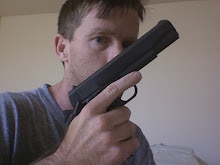My blog-friend Mike W. engaged in an interesting little exercise the other day -- word substitution -- in which he changed some words in a comment an anti-gunner made to him:
"One of Mike W.'s problems is that he demands we all trust every black voter, and that’s just not realistic. I have no idea who these black voters are – they are strangers – and, yes, I would be intimidated if I went to the polls and there were large black men voting – because I DON’T KNOW THEM!"
Sounds pretty bigoted, doesn't it? Well, replace "black voters" and "large black men voting" with "gun owner" and "people openly carrying guns" and you have the exact comment made to Mike W. at Delaware Liberal.
Of course, the gun blogosphere's resident troll Mike B. took exception, saying, "I don't find that convincing at all....It makes no sense to replace the words with something else. And besides, if the supposed bigotry is so obvious, why would you have to substitute the words with something else? You wouldn't have to because there's no bigotry there and the substitution game doesn't work."
Of course, the point sails over his head by an as-yet-undetermined number of light-years. The fact that he and those like him don't think that's bigoted doesn't mean it isn't. The fact that we have to resort to the tactic is nothing more or less than an indicator of where we are as a society. You might even say our use of that tactic is a result of society's ingrained attitudes towards guns and the people who own them. It's so deep that it's like breathing to a lot of people and they're not going to see that attitude for the bigoted one that it is unless it's pointed out to them by substituting a group that was once discriminated against but isn't anymore.
And I see nothing wrong with substitution to achieve this end; after all, there's no doubt that in some ways we are a more enlightened, open minded and tolerant society than we were, say, back in the 1950s. And the attitude that it was okay to make black people go to different schools, drink from different water fountains, etc. was just as deeply ingrained in the minds of Americans back then as the idea is now that many if not most gun owners are walking powder kegs just waiting for a match. But with time and unorthodox tactics, American blacks helped eviscerate the institutional and individual bigotry that plagued the country, although it arguably remains in certain places to an extent.
However, in other areas, some people -- despite their squawking about being tolerant and open-minded -- are still every bit as bigoted towards guns and gun owners as many Americans were towards black people in the 1950s. Not only do they retain that bigotry -- one might even say they bitterly cling to it -- but they also flatly refuse to recognize it as it stares them in the face, rattling off claptrap like "it makes no sense to replace the words with something else" and refusing to enunciate just WHY it makes no sense. Just why they do it, I really don't know. But I do find it comforting that they yell so loud about being characterized for what they are. I hope that idea takes root and grows in the population.
For now, it's arguably still safe to say, "...the life of the gun owner is still sadly crippled by the manacles of segregation and the chains of discrimination."
UPDATE, from Boomer Lad, in comments:
Without the ARMED Deacons for Defense and Justice, still might be separate lunch counters and drinking fountains.
Read all about it. It's a good book that should be on every gun owner's shelves and truly needs to be addressed in public schools as well. MLK would have died a lot sooner without them. Non-violence didn't win civil rights. The Deacons and Black Panthers did. As a Panther said in a forgotten referenced interview I've read, "Oakland cops didn't stop beating up niggers for no reason until we started following them around with shotguns."
Yes, indeed. One could say that was one of those unorthodox tactics, one that almost no one likes to talk about. I was quite remiss in not mentioning that. Thank you, sir. I will have to check out that book.


|